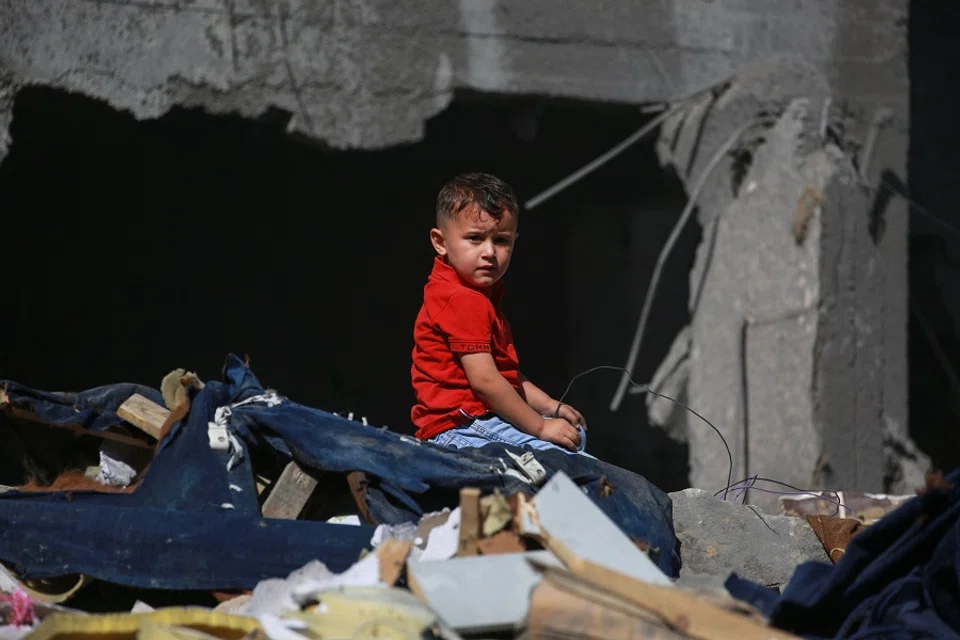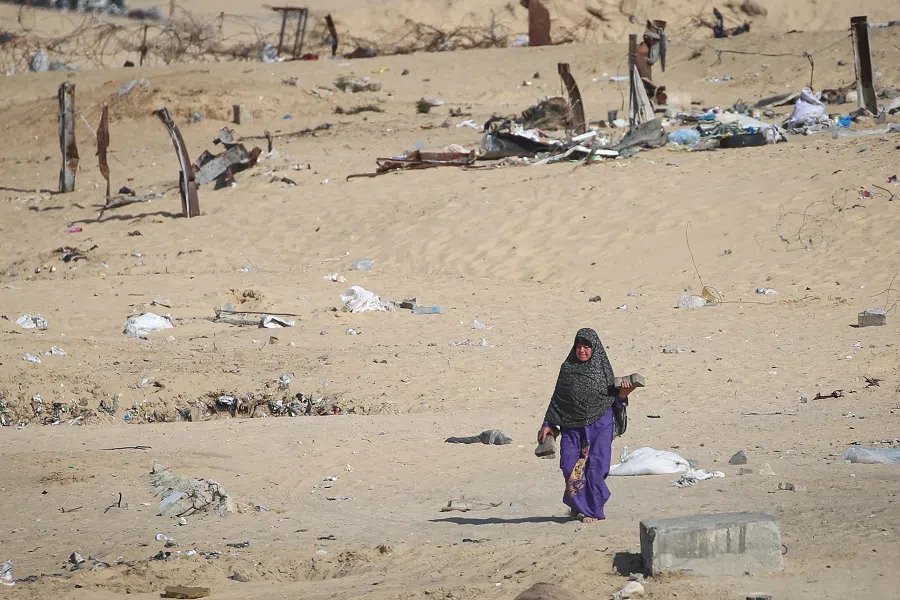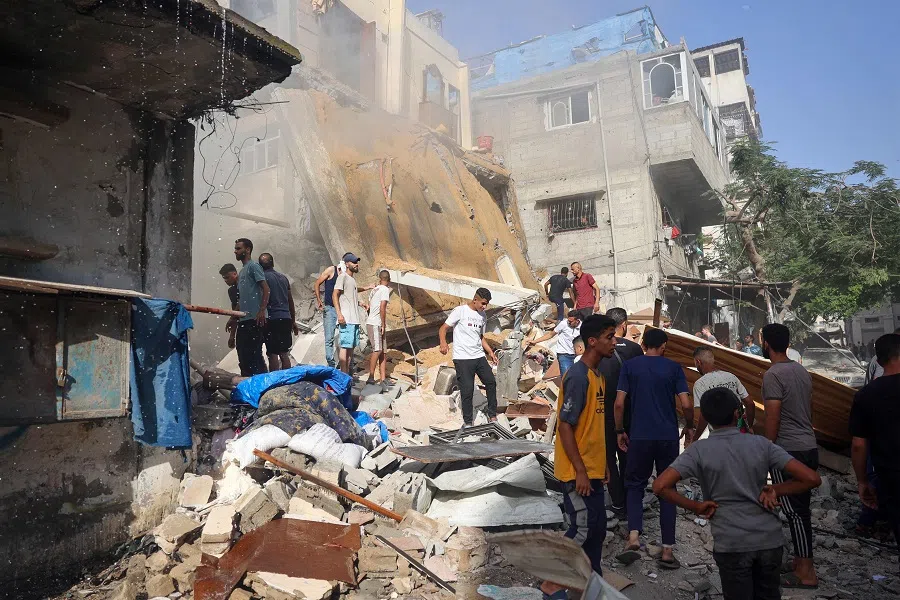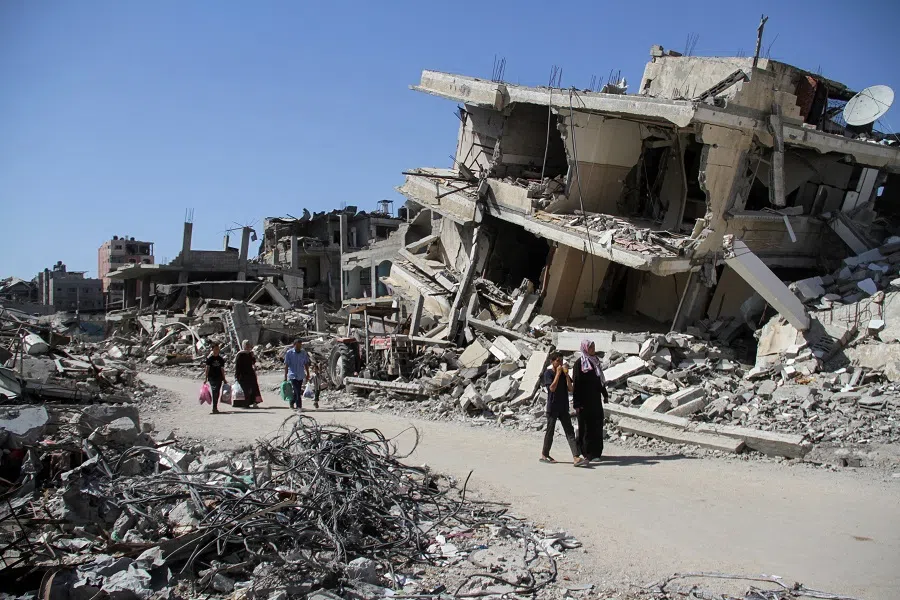Are you brainwashed in the cognitive war of news reporting?
News reporting today seems to be inherently biased, says Lianhe Zaobao associate editor Peter Ong. Journalists and readers need to be wary of being caught in an echo chamber.

Geopolitical winds are shifting, as seen from the daily news reports put together by our foreign and China desk colleagues, which we jokingly refer to as “today’s menu”.
In the past three to four years, content on close cooperation and interactions between countries has been squeezed out by hatred, criticisms and various calculations aimed at decoupling. Now, the predominant narrative revolves around hostility and the smell of gunpowder and conflict.
During the Cold War era before I joined the media industry, there seemed to be fewer abhorrent events. Back then, there was no internet or social media, and ordinary people from the Eastern and Western camps did not interact — perhaps this led to some perception of beauty borne of distance?
Besides negative topics, when it comes to writing style, everyone has also ripped off the veil of professionalism and entered a mode of cognitive warfare where they advance their own agendas. Most international news reports from Western news agencies reflect their biased stance and habitual thinking, differing only in how cleverly they do it, whether it is hard selling or quiet brainwashing.
The first incident that opened up my eyes was the Russia-Ukraine war, followed by the six-month-plus war in Gaza. While the impact of the latter may not be as great as the former in altering the trajectory of human destiny, the stirring of hearts worldwide and the moral debates it sparked are unprecedented. Thus, using Gaza as a case study aptly illustrates the intentionality of Western media reports and highlights how objectivity and veracity can be easily compromised.
To call it a “war” between two sides is just a rhetorical trick from the start. The Palestinians can even call this a massacre, an uprising or a resistance movement, even though it is doomed to fail.
At full blast
Confucius once said, “What is necessary is to rectify names (必也正名乎).” In fact, Israel and Western media practitioners understand this full well — starting from the day after Hamas launched an attack on Israel on 7 October 2023, they referred to future military operations as the “Israel-Hamas” war, explicitly expressing that they are holding Hamas militants accountable for the conflict, not the Palestinian people. But the reality is that Israel has indeed dropped 2,000-pound bombs, which have decimated entire buildings — the attacks are indiscriminate.

As at the time of writing, over 36,000 Palestinians have lost their lives — if Hamas was the only target, it would have been wiped out by now. In any case, this is undoubtedly an “Israel-Palestine” conflict — not Israel-Hamas — because Israel is ultimately killing Palestinians and not just the armed forces representing them.
At the same time, saying that this is a “war” between two parties is also inaccurate. The premise of war is that both sides are basically equal in strength, or at least at a ratio of 4:6 or 7:3. Although Ukraine is a small country compared to Russia, it is at least an independent state with a regular army. Crucially, it is backed by NATO — although it is struggling to survive, it can still make the invader suffer.
On the other hand, Gaza is just an “open-air prison” under an air, land and sea blockade all year round. Its weapons are smuggled in via tunnels and they have no air defence overhead. The enemy decides if they want to attack the area in the morning or at night, and the people can only hide, or lose their lives.
Clearly, in the balance of power, the Palestinians and Israelis are not even 1:9. To call it a “war” between two sides is just a rhetorical trick from the start. The Palestinians can even call this a massacre, an uprising or a resistance movement, even though it is doomed to fail.
... when it comes to Israel, no modifier is used; but when it comes to Hamas, it would be modified by “Islamist group”.
Double standards
In any case, both sides have sought to characterise the conflict from their own perspective; the only difference is that the voice of the weaker party often goes unheard. On the other hand, the powerful, wielding discourse power, adeptly exploits the ubiquity of media even before history is written, ensuring that their preferred narrative is reiterated in every report. While entrenching the words “Israel-Hamas war” into people’s perception cannot rationalise Israel’s ground invasion and genocide “from the river to the sea”, it can certainly obscure or mislead to a certain extent.

The more obvious bias in Western foreign news reports on Gaza is the frequent use of modifiers. For example, the following sentence is one I would come across almost every day: “…between Israel and the Palestinian Islamist group Hamas…” Indeed, when it comes to Israel, no modifier is used; but when it comes to Hamas, it would be modified by “Islamist group”. The term “Islamist group” is already relatively moderate — occasionally, depending on the context, it could be replaced by Islamist terrorist group, extremist group, radical group and even adjectives such as barbaric and savage.
Putting aside the accuracy and necessity of these modifiers, and discussing equal treatment alone, why is Israel not modified by “Jewish country” or have “Jewish regime” added? This is indeed strange and unnatural. So why does it seem so natural for Hamas? Does this echo Western society’s persistent “Islamophobia” and various prejudices, and the belief that such reminders are necessary?
Foreign media never labels Israel or the Israeli government as an oppressor, invader or apartheid-enforcing and genocidal. But the fact of the matter is that this country has been constantly doing this since 1948. Of course, lesson one on news writing is always to objectively and accurately state the facts, and not make value judgements or use modifiers. But when it comes to writing about Palestine or Hamas, that principle is thrown out the window, leading to endless revisions.
Did it all begin on 7 October 2023?
On 8 June, international news outlets reported that four Israeli hostages were miraculously rescued, each of them identified by name and age. This approach is commendable as it makes for a richer news report. This personalised element is also commonly seen in past reports on hostages and their family members.
But when have we ever seen the names and identities of Palestinians who have been imprisoned or released in exchange for Israeli hostages? In fact, I believe you and I do not even have a general idea of the number of people imprisoned, do we? Because this is unimportant to Western reporters, and they are uninterested to find out. At the end of the day, the status accorded to someone can vary significantly.
... the hidden message is: Hamas is the instigator of the conflict. This in turn leads readers to believe that whoever started it is at fault or even deserves to bear the consequences.

As much context has to be given to a news report as possible. So when foreign news outlets wrote about the Gaza conflict earlier on, they would always state that Hamas had launched an attack at a music festival on 7 October 2023, killing people and taking hostages. This approach is correct, but if they were to trace further back, it may make some of their supervisors uncomfortable.
In the end, the hidden message is: Hamas is the instigator of the conflict. This in turn leads readers to believe that whoever started it is at fault or even deserves to bear the consequences. This is why most people are uninterested to find out or are even clueless about what Israel did in Gaza and the West Bank decades prior.
At the beginning of the war, the “right to self-defence” was often quoted in Western media reports, but only in relation to Israel — they disregarded the fact that Hamas’s terrorist attack was also an act of self-defence. Some people even subscribed to Israel’s advocacy of the principles of disproportionate retaliation and deterrence.
However, as the death toll in Gaza rapidly rose, with nearly 30 Palestinian deaths to one Israeli, such a subscription has become extremely politically incorrect. Imagine if the other side also retaliated in the same insane manner — Israel losing 30 times the number of lives lost in Gaza would mean over 1 million deaths! Of course, Hamas is incapable of doing that.
False rhetoric
In response to the fallacy and rhetoric that the conflict started on 7 October last year, United Nations secretary-general António Guterres said in fairness: “It is important to also recognise the attacks by Hamas did not happen in a vacuum. The Palestinian people have been subjected to 56 years of suffocating occupation.” But he also added, “But the grievances of the Palestinian people cannot justify the appalling attacks by Hamas. And those appalling attacks cannot justify the collective punishment of the Palestinian people.”

Western reporting is also often peppered with lies, half-truths, and even narratives that go against common sense. For example, when I was handling a story about Israeli forces planning to flood Gaza’s tunnels, I could not understand why the word “water” was used throughout the article. Given that freshwater is scarce in Gaza and the parties are in the midst of a war, surely only seawater was available. I also vaguely remember reading that once the tunnels are flooded with seawater, groundwater will be contaminated, threatening the survival of several generations and causing immeasurable harm to the environment.
My colleagues reread the foreign reports several times, and concurred that only “water” was used. In the end, we made the decision to use the word “seawater” in the headline and body of our report. When I got off work, I took a look at The Times of Israel website, and they indeed had “seawater” in their headlines. I became certain that reporters and their supervisors from international news outlets do not mind making fools of themselves, but they actually think everyone else are fools as well.
Now, the question is, have these strong discourses and rhetoric tricks, as often adopted, achieved their objectives?
Of course, many people have been fooled and led by the nose. But it appears that the sober-minded are growing in numbers, as evidenced by the many campus protests across the world, while on the internet, a growing number of people are singing a different tune.
... on social media platforms such as X and TikTok, pro-Palestinian content and dissemination rates have overwhelmingly eclipsed that of pro-Israel ones. This is in stark contrast to Ukraine — although it is also invaded, we do not see or hear about their sufferings.
An emperor without new clothes?
Why did the Western media machine falter this time? The reasons for this are complex. Due to lack of space, I will briefly mention two observations.

One, social media functions as a substitute. With a Muslim community surpassing 1 billion members, the broad spectrum of reports not limited to the English language, as well as narratives extending beyond Palestinians in Gaza — which include the rightful fury of sympathisers worldwide — these voices of solidarity are magnified exponentially on social media, spreading rapidly and fostering a burgeoning global alliance for justice of sorts. Regardless of the efforts of Western mainstream media to sway direction, the tactics of Jewish lobbying groups, or the influence of the mysterious “deep state”, it cannot be stopped.
In particular, on social media platforms such as X and TikTok, pro-Palestinian content and dissemination rates have overwhelmingly eclipsed that of pro-Israel ones. This is in stark contrast to Ukraine — although it is also invaded, we do not see or hear about their sufferings. Why? For one, they have a much smaller population than Muslims worldwide; also, content dissemination is difficult relying on the Ukrainian language alone.
The second observation also has to do with the unfortunate situation in Ukraine. The simultaneous outbreak of two wars has presented a moral dilemma for the West. After all, it is condemning Russia’s blatant aggression while condoning Israel’s atrocities in Gaza, and affirming Ukraine’s right to defend itself while remaining indifferent to Palestine’s plight, which in fact resembles more of a persecution, plunder and ethnic cleansing. It is really difficult to justify such double standards.
The US’s awkwardness and absurdity is particularly striking. As US President Joe Biden was telling Israeli Prime Minister Benjamin Netanyahu about the latter’s lack of protection of Gaza civilians, and subsequently put forth his “red lines”, transport planes were carrying large quantities of ammunition to Tel Aviv. Clearly, the former is more of a PR show, and the main consideration is still votes. Indeed, the US faces no international pressure, only domestic pressure. But its hypocrisy has been completely exposed, damaging its credibility.

To a certain extent, the plight of Western politicians is also the plight of the media. In terms of professional conduct, everyone is gradually seeing through the emperor’s new clothes.
... and every piece of information — whether from mainstream media or social media; Western or Eastern sources — should be approached with scepticism and critical evaluation.
Standards are not dead
However, it must be pointed out that in the newsroom, there are still colleagues who engage in self-reflection and refuse to be silenced or exploited by capital interests and political agendas. For example, during an internal meeting of 200 staff at the Australian Broadcasting Corporation (ABC) at the end of last year, dissatisfaction with the management’s pro-Israel editorial policy was expressed, and the meeting summary was leaked, attracting much attention.
It was only from this summary that outsiders realised that ABC staff have so many “rules” to follow. For example, news is primarily based on Israeli sources; the use of “Palestine” is refused; and there is a “reluctance” to use words such as war crimes, genocide, ethnic cleansing, apartheid and occupation when Israel is involved, but the negative labelling of Palestinians is regular practice.

Shortly after this “internal rebellion”, a female ABC news broadcaster was prematurely fired for reposting on her Instagram account a video accusing the Israeli government of using “starvation of civilians as a weapon of war in Gaza”. This incident led to a bigger reaction because it was rumoured that the company was influenced by Jewish lobbyists. In the end, supported by the union, the female broadcaster sued her employer, with the case expected to go to federal court soon.
So, here is a friendly reminder: today’s news landscape is not what it used to be, and every piece of information — whether from mainstream media or social media; Western or Eastern sources — should be approached with scepticism and critical evaluation. If you realise that you’re trapped in an information cocoon, quickly escape by strengthening your media literacy and exposing yourself to diverse channels. It also helps to have a solid knowledge base.
Otherwise, in cognitive warfare, you will fall first even before the enemy strikes.
This article was first published in Lianhe Zaobao as “新闻认知战来了,你有被洗脑到吗?”.

![[Big read] Paying for pleasure: Chinese women indulge in handsome male hosts](https://cassette.sphdigital.com.sg/image/thinkchina/c2cf352c4d2ed7e9531e3525a2bd965a52dc4e85ccc026bc16515baab02389ab)



